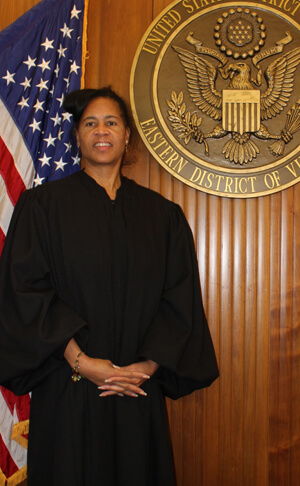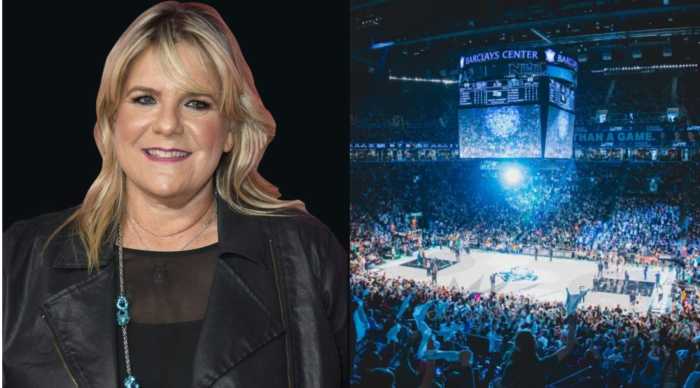Judge Arenda L. Wright Allen. | US DISTRICT COURT/ EASTERN DISTRICT OF VIRGINIA
A three-judge appellate hearing in the Virginia marriage equality cases arrayed Ted Olson, the renowned litigator brought into the successful fight against California’s Proposition 8, the American Civil Liberties Union (ACLU), and the state’s solicitor general against two county clerks, one of them represented by Alliance Defending Freedom, a right-wing group that battles gay marriage and other LGBT rights advances in courts across the nation.
The May 13 oral arguments made clear that this considerable legal firepower had a sharply divided panel of the Richmond-based Fourth Circuit Court of Appeals as its audience and arbiter.
Olson, a former US solicitor general who served under President George W. Bush, appeared on behalf of two client couples — Timothy Bostic and Tony London, who seek the right to marry, and Carol Schall and Mary Townley, who are asking that Virginia recognize their out-of-state marriage. In February, those plaintiffs prevailed in a ruling from Judge Arenda L. Wright Allen of the Eastern District of Virginia.
With Ted Olson, the ACLU, and Alliance Defending Freedom all in the mix, one judge played the swing vote
Since Virginia’s new Democratic governor, Terry McAuliffe, and attorney general, Mark Herring, also a Democrat, have declined to defend the state’s ban on same-sex marriage, Wright Allen’s decision was appealed by two county clerks, represented before the Fourth Circuit panel by Austin Nimocks, an Alliance Defending Freedom attorney, and David B. Oakley, a private attorney.
The appeals panel allowed the two plaintiff couples challenging the Virginia marriage ban in the state’s other federal district court, which has not ruled, to intervene, so those couples — Joanne Harris and Jessica Duff, and Christy Berghoff and Victoria Kidd — were represented in the oral arguments by James Esseks, who heads up the ACLU’s LGBT Rights Project.
McAuliffe and Herring, who have concluded that same-sex couples have a constitutional right to marry, were represented by Virginia Solicitor General Stuart A. Raphael, who urged the panel to affirm Wright Allen’s February ruling.
The panel of judges had a mix of political pedigrees appropriate to the breadth of the advocates before them. The most senior of the three is Paul V. Niemeyer, appointed to the court by President George H.W. Bush. The circuit’s first African-American judge, Roger L. Gregory, originally took his seat on the court as the result of a recess appointment by Bill Clinton late in his second term — a move that temporarily sidestepped the need for Senate confirmation — but was re-nominated by George W. Bush as part of a deal to break the deadlock on the new president’s early judicial appointments. Judge Henry F. Floyd was appointed to the circuit court by President Barack Obama, but was first named to the federal bench by George W. Bush. Prior to that appointment, Floyd was a Democratic state legislator.
Despite Niemeyer’s insistence that counsel and spectators should not make assumptions based on his questions, it seems clear he is very resistant to the idea that the Constitution compels Virginia to allow same-sex couples to marry. Last year’s ruling in the Defense of Marriage Act, in his view, was guided by principles of federalism in finding the US government could not refuse to recognize a marriage a state had authorized. Though Justice Anthony Kennedy’s opinion for the court devoted several pages to discussing the traditional role states have in deciding who can marry, he also stated explicitly that the case was decided by Fifth Amendment due process and equal protection requirements.
Oakley and Nimocks repeatedly pressed the view suggested by Niemeyer — that DOMA was really a federalism case
Hammering this point home, Nimocks quoted the last paragraph of Kennedy’s opinion: “The federal statute is invalid, for no legitimate purpose overcomes the purpose and effect to disparage and to injure those whom the State, by its marriage laws, sought to protect in personhood and dignity. By seeking to displace this protection and treating those persons as living in marriages less respected than others, the federal statute is in violation of the Fifth Amendment. This opinion and its holding are confined to those lawful marriages.”
In other words, Nimocks argued, the DOMA case was specifically about the right of the states to decide who could marry and which marriages to recognize, and the court’s decision rejected the authority of the federal government to decree that it would not recognize certain marriages recognized by the state. That ruling was, in his formulation, essentially irrelevant to the question of whether the 14th Amendment requires states to allow or recognize same-sex marriages.
Arguing on behalf of the plaintiff couples, Olson, Esseks, and Raphael emphasized how constitutional doctrine has developed over the course of Supreme Court decisions to the point where Wright Allen’s ruling was inescapable, or in Raphael’s words, “ineluctable.”
Olson’s time devolved into a rapid back-and-forth with Niemeyer, who was particularly combative in rejecting the idea that the union of a same-sex couple could be seen as “the same” as that of a different-sex couple. He insisted that the word “marriage” should not be used for the former, because same-sex couples have a “different relationship.” He conceded that the state might want to confer the rights and benefits long associated with marriage on same-sex couples, but stated that this was a decision for the state to make.
In challenging the district court ruling, Oakley focused on the significance of Virginia voters having supported the marriage amendment by a clear majority, but Niemeyer didn’t seem to place particular weight on that. Instead, he insisted it was not “particularly useful” to compare the “new relationship” of same-sex unions with heterosexual marriages.
The other judge on the panel who gave rather clear signals of his sympathies was Gregory, who hammered Nimocks during his rebuttal argument, continuing his questions well past the point the red light began flashing on the podium. In good humor, Niemeyer said they could keep going as long as Gregory had questions.
Nimocks returned repeatedly to an argument that Virginia had an interest in ensuring that children benefited from the “diverse parenting” a father and a mother offer, stating that a right to what he termed “genderless” marriage merited no due process protection because it had no deep historical roots. Mindful no doubt of the many instances in which the Supreme Court has identified the “right to marry,” he seemed intent on referring instead to the “right to enter into the union of a husband and a wife.”
Characterizing Nimocks’ purported concern for the welfare of children as “disingenuous,” Gregory pressed him for how he views the needs of children raised by same-sex couples.
The swing vote, then, will come from Floyd, and he was relatively silent compared to his two colleagues. During Oakley’s opening argument in opposition to Wright Allen’s marriage equality decision, however, Floyd made a point of asking whether the right to marry is about an individual’s right to choose their marital partner as opposed to a right of a couple to marry. He also focused, during Nimocks’ argument against the district court ruling, on what justification Virginia has to refuse recognition to out-of-state same-sex marriages, especially when children are involved.
The ACLU’s Esseks emphasized the question of what level of judicial scrutiny should be used to evaluate Virginia’s marriage ban, arguing that some form of heightened scrutiny, which would require the state to affirmatively justify a discriminatory policy, should apply. Here, Niemeyer pushed back, pointing out that the Supreme Court has never specifically held that sexual orientation discrimination merits heightened scrutiny. The DOMA ruling, he said, is a “difficult opinion to read,” circling back to his opening depiction of it as a federalism case.
Esseks responded with a description of the “triggers” that in past cases have moved the high court to apply heightened scrutiny, and argued that several of them are evident in Virginia’s marriage ban.
Perhaps tipping his hand on where his thinking is, here Floyd asked about the approach taken by the First Circuit Court of Appeals in Boston in one of the DOMA cases, where it applied “careful review” as opposed to “heightened scrutiny.”
Esseks was careful to argue, however, that even if the most lenient standard of judicial review were applied, Virginia’s policy would fall since excluding same-sex couples from marriage didn’t advance any of the policy goals identified by its defenders.
Raphael, the solicitor general, argued, as had Olson, that the marriage ban discriminated not only on the basis of sexual orientation but also on the basis of gender, on which ground it would clearly merit heightened scrutiny.
“This is an explicit gender classification,” he said, citing a prior Niemeyer opinion to argue that laws using gender classifications should be subjected to heightened scrutiny for which Virginia must demonstrate that a policy under challenge substantially advances an important state interest. The state might have an interest in seeing that heterosexual couples raise their children in a stable environment, but there is no evidence that banning same-sex marriage makes it more likely that different-sex couples will marry in order to create that environment.
While acknowledging that the DOMA ruling devoted substantial attention to the traditional role states have played in defining marriage, Raphael pointed out that states remain bound by federal constitutional requirements.
The bottom line? As with last month’s 10th Circuit arguments in the Utah and Oklahoma cases, it appears that at least one panel member is predisposed to reverse the district court’s marriage equality ruling, one member seems clearly inclined to affirm it, and the last is harder to read. As out west, however, it also appears possible, if not likely, that the swing vote will swing in favor of marriage equality in Virginia.
Still, as Niemeyer said early on in the hearing, the Fourth Circuit is just a “way station” on the road to the Supreme Court. And that is a call that will probably be made in 2015, after a year of heated argument in appeals courts across the nation.


















